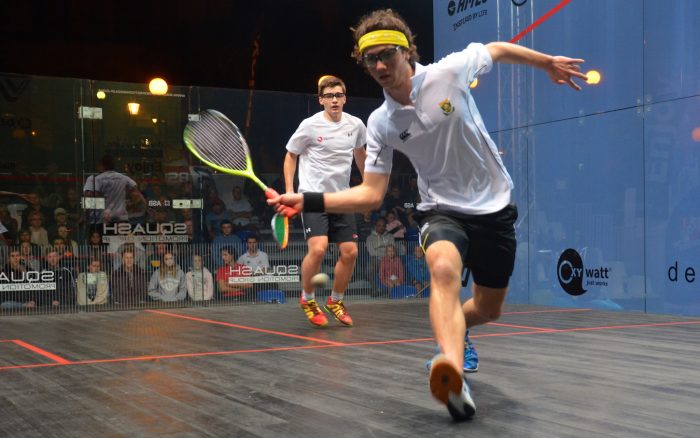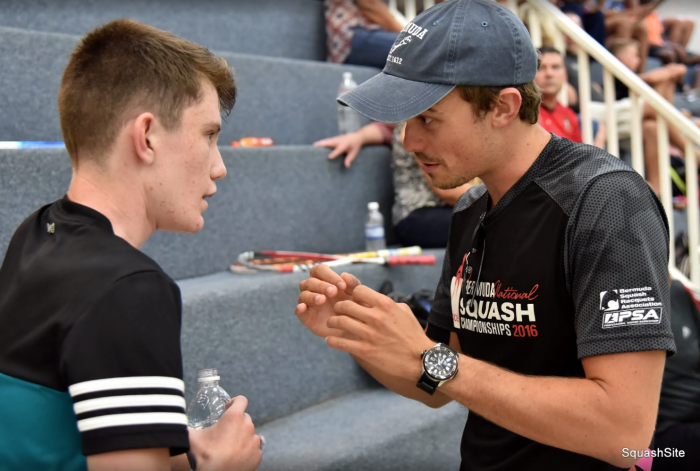For those that coach juniors, or have children of their own that are keen squash players, the question often comes up of “How soon should my child specialise in just the one sport?”
It’s a difficult one to answer with lots of factors to consider, and it can often be tough to give a categorical response.
Working with junior athletes, most experts agree that it’s a good idea to encourage them to play a diverse range of sports when they’re younger – the increased social interactions, along with the greater range of motor skill development and general athleticism that is built, make this early stage diversity an important phase of the growth and maturity of any young sportsperson. At a younger age, research suggests that children have a greater ‘window’ of potential athletic development, which can be maximised by working a wide range of different sporting activities and training methods.
Of course, if a player is to maximise their potential, there has to come some point where they start to train more specifically in that sporting area. It is difficult to give a set age for this, as children will all grow and mature at different rates. With this in mind, a lot of major sporting teams and organisations tend to look more at a youngsters ‘biological age’ as opposed to just their ‘chronological age’ nowadays, to determine when their bodies have matured enough to develop and progress their training.
 Usually for most young athletes, this time will be around the mid-teens – without the benefit of access to detailed scans and physiological assessments that the larger sporting organisations might employ, around 15 years of age (maybe slightly earlier or slightly later for any individuals with obvious greater or lesser physical development for their age) is when it’s typically best to start to encourage a young player with potential to start dedicating a little more time to their squash, if they are keen to pursue it seriously. This generally means a couple of more hours on court per week to start with, alongside a more specialised physical training programme starting to separate out devoted speed, power, strength, and endurance sessions.
Usually for most young athletes, this time will be around the mid-teens – without the benefit of access to detailed scans and physiological assessments that the larger sporting organisations might employ, around 15 years of age (maybe slightly earlier or slightly later for any individuals with obvious greater or lesser physical development for their age) is when it’s typically best to start to encourage a young player with potential to start dedicating a little more time to their squash, if they are keen to pursue it seriously. This generally means a couple of more hours on court per week to start with, alongside a more specialised physical training programme starting to separate out devoted speed, power, strength, and endurance sessions.
There are always exceptions to any rule however, with individuals like Tiger Woods, Lionel Messi, and the Williams sisters playing their sports to the exclusion of almost everything else at an insanely young age, and proving that this method can also produce great players. Many experts would argue though that the increased injury risks, potential burnout, and general lack of enjoyment from taking sport too seriously at a younger age makes this early specialisation a very risky strategy, that doesn’t always have the child’s best interests in mind.
 It is also unfortunately rather easy for children (and perhaps even more so their coaches/parents) to get a little too obsessive about rankings at u11/13/15 level in a sport like squash, to the detriment of their all-around development. There are some issues of course with rankings having a bearing on county/regional/national selection, and the resultant access to further coaching and training opportunities, but it’s generally agreed that ‘chasing rankings’ at a younger age is not the best way to optimally develop and grow as a young athlete.
It is also unfortunately rather easy for children (and perhaps even more so their coaches/parents) to get a little too obsessive about rankings at u11/13/15 level in a sport like squash, to the detriment of their all-around development. There are some issues of course with rankings having a bearing on county/regional/national selection, and the resultant access to further coaching and training opportunities, but it’s generally agreed that ‘chasing rankings’ at a younger age is not the best way to optimally develop and grow as a young athlete.
If you would like to read more about this issue, there is a good short Men’sHealth article here that speaks to several coaches and experts to get their views. For those looking for further reading, there’s an excellent two-part Sport’s Scientists article with more of an in-depth analysis and discussion here and here that is well worth a read.
Gary Nisbet
B.Sc.(Hons), CSCS, NSCA-CPT, Dip. FTST
SquashSkills Fitness & Performance Director
Want to learn more about coaching juniors?
Check out this round-table discussion with Bryan Patterson where he talks us through his process of coaching juniors through competitive matches both on court and off court.
Watch now